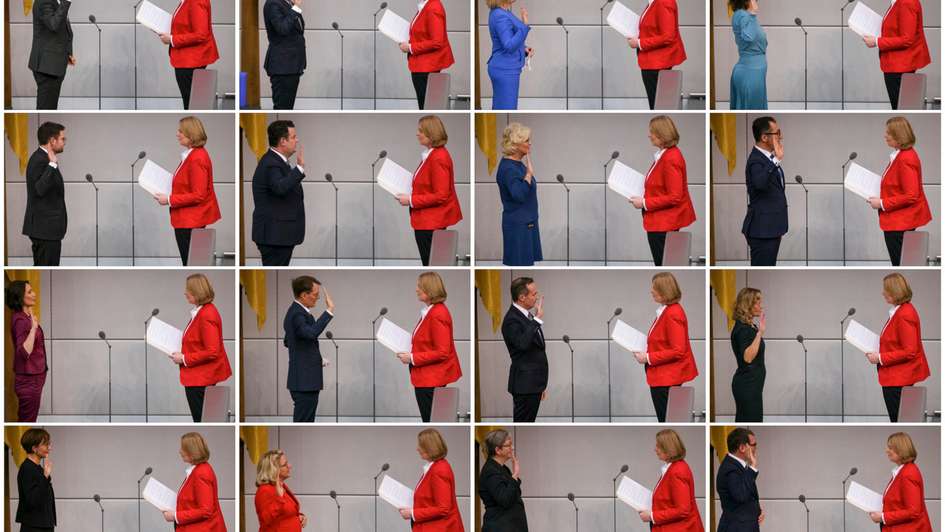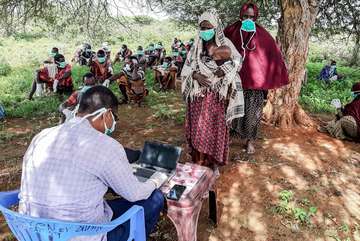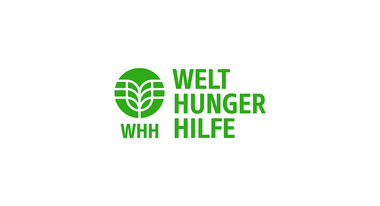The new German coalition government: Dare to make even more progress!
The new German government must address the fight against hunger holistically and food security systemically, admonishes Mathias Mogge. A commentary on the coalition agreement (“Dare to make more progress!“) from the perspective of the General Secretary of Welthungerhilfe and Chairman of the Board at VENRO.

According to the coalition agreement of the three government parties, the 2030 Agenda and the Sustainable Development Goals (SDGs) associated with it are the "guiding principles" of the German government's policy, just as they were for the previous government. With only eight years left until 2030 and the world lagging far behind in meeting some of the SDGs, the new federal government must make significant efforts to do its part to implement them.
First, the preservation of the Federal Ministry for Economic Cooperation and Development (BMZ) is an important and also forward-looking decision of the new coalition. The perspective of the Global South also belongs at the cabinet table of the Federal Government, not only Germany’s own foreign policy and economic interests. The Southern perspective can be a clear amplifier for the implementation of the SDGs.
The coalition agreement quite prominently addresses the fight against hunger and the achievement of food security . The approach of linking the fight against hunger and poverty with the commitment to climate justice, biodiversity, and socio-ecological transformation is also the right one. Global hunger can only be ended sustainably if its complex causes are addressed: the impacts of the climate crisis, armed conflicts, and the effects of the corona pandemic as immediate causes, and worsening economic and social inequalities as structural causes.
A future fight against hunger would dare to make more progress if it took into account the complexity of food systems and took a systemic approach ¬- that is, not looking at isolated causes. So far, food systems are only mentioned in the coalition agreement as part of Central Research Area Two - "Climate, Climate Impacts, Biodiversity, Sustainability, Earth Systems, and Related Adaptation Strategies, as well as Sustainable Agriculture and Food Systems." This must not be the end of the story.
BMZ's policies must be more closely coordinated with those of other ministries in order to prevent policies in other areas from having a negative impact on people in the Global South, especially on their food security. On July 13, 2020, the Committee of State Secretaries for Sustainable Development already presented important resolutions for the design of sustainable food systems. These should be urgently implemented by the new German government.
Safeguarding the human right to food
The necessary transformation must be built upon a human rights approach. The human right to food must be at the centre of future food security policy, but we miss the reference to it in the coalition agreement. If the coalition partners are committed to "peace, freedom, [and] human rights...," it would only be logical to also commit to ensuring that instruments of international law such as the UN Guidelines on the Right to Food are incorporated into national laws, policies, and programs in Germany, as well as globally and in partner countries of development cooperation.
The coalition agreement clear emphasizes social protection systems, through the goal of creating a Global Fund for Social Protection. We very much welcome this, because in the course of the COVID-19 pandemic it became obvious how crucial these systems are for combating hunger and poverty, especially when individuals have lost their incomes through no fault of their own.
Our major concern is the impact of the coronavirus pandemic on the already large hunger figures over the past 20 months. According to the Global Report on Food Crises,1 161 million individuals are currently in a food crisis. (IPC3 2 Of these, 35 million are even in an emergency situation (IPC 4); in its September 2021 update, the the World Food Programme (WFP) estimates that this number could be as high as 41 million. In addition, more than half a million individuals are in a famine situation (IPC 5, Ethiopia, Madagascar, South Sudan, and Yemen). This year's FAO report on the State of Food Security and Nutrition in the World (SOFI Report) indicates that up to 811 million people are currently hungry – and this year's Global Hunger Index predicts that 47 countries will not reach low levels of hunger by 2030 at current rates.
These figures show how important it is to more effectively continue the fight against hunger. The new German government should work especially hard to ensure that other donors also recognize this urgency and make appropriate contributions.
Securing funding
The coalition agreement includes a commitment to international financial obligations for development financing, including to provide 0.7 percent of Germany’s overall GNI for development cooperation, including 0.2 percent for the least developed countries (LDCs). In contrast to the last government, the current agreement sets these values as a minimum. Nonetheless, according to the coalition agreement, these percentages are not to be enshrined in law. It therefore remains questionable whether this will be enough to implement the commitments. In fact, this percentage target has been repeatedly issued in the past, but in recent history it was achieved mainly by offsetting the costs of accommodating refugees in Germany. We presume that this commitment is also already being reflected in the medium-term financial planning of the federal government, and not only after "closing the books."

We expect the commitment to be reflected already in the medium-term financial planning, and not only after "closing of the books".
Mathias Mogge Secretary General and Chief Executive Officer of WelthungerhilfeIn addition, we cannot find an explanation of how the goals for food security are to be financed. The CERES 20303 study calculated that rich countries would have to increase their development aid for agriculture and rural development by 14 billion US dollars per year from 2020 to 2030 to achieve the G7 goal from the 2015 summit in Elmau, namely, to free 500 million individuals from hunger. Yet the coalition agreement contains neither this target nor a reference to the corresponding funding. The expectations here are clear, especially in the run-up to Germany's G7 presidency in 2022: the financial commitment must be further increased, and other G7 countries must follow suit to jointly reach the necessary spending level.
As in the 2017 coalition agreement, the new government‘s agreement includes the formulation that the budget for crisis prevention, humanitarian aid, foreign cultural and educational policy, and development cooperation should increase on a scale of 1:1 to the budget of the Ministry of Defense. Given the increase in armed conflicts (an increase from 39 to 56 from 2010 to 2020) and the rising need for emergency aid, it is difficult to be happy about such a "minimum mark" set for development cooperation. A total of three percent of GNI is to be made available for international action. That diplomacy and development cooperation come first and only then the military is certainly a good order.
Better coordination of ministries
The planned increased coordination between all ministries spending in the areas of "foreign affairs, security, defense, development, and human rights" is an overdue improvement, but it remains to be seen how this coordination will take place. Unfortunately, the federal government has often not addressed the need for better coherence, repeatedly called for by civil society. At a minimum, other areas, such as economic, trade, security, and agricultural policy, must not contradict – much less undermine – the objectives of development policy.
Unfortunately, there is no spirit of renewal on the subject of Africa either. The G20 Compact with Africa, which is not without controversy, is to be continued as before. In addition to the Compact, a bundle of Africa policy initiatives emerged between 2017 and 2019 that are not specifically mentioned in the coalition agreement, but will certainly continue to exist – from the 2017 BMZ Marshall Plan with Africa (with a goal of sustainable development of the African continent in the sense of the 2030 Agenda) to the 2019 development investment fund AfricaConnect (aimed at financing German companies in Africa) to AfricaGrow (aimed at financing African companies). In 2019, BMZ also launched the special initiative "Jobs and Employment." The result is that the plethora of initiatives has become confusing. The new German government should review its instruments for efficiency and effectiveness.
Despite the lack of success of engagement in the Sahel region, it should be continued. At the very least, previous engagement should be critically reviewed, particularly against the backdrop of the failed Afghanistan approach. Overall, passages of the coalition agreement contain remarkably warm words that reflect a surprisingly traditional image of Africa for a federal government. We would have liked to have seen a long-awaited announcement in the field of cultural policy in development cooperation, especially in the paragraph on dealing with Germany's colonial heritage and the planned "Special Programme Global South."
Simplifying partnership
It is encouraging that many parts of the coalition agreement clarify the importance of civil society . For a long time, civil society has called for the allocation and funding guidelines of BMZ and the Foreign Office to be simplified. Now there is a corresponding sentence in the coalition agreement. In fact, the administrative requirements for applications and reporting obligations have become increasingly complex in recent years. Civil society organizations have to find more and more resources to keep up with these requirements. A bold move is needed here to simplify the application and implementation of programs and adapt them to reality. This also includes a review of the funding periods.
Emergency aid has become an important instrument of German foreign policy. The global significance of the increase in funding in recent years is also reflected in the coalition agreement. The anchoring of the Humanitarian-Development-Peace Nexus, the Grand Bargain for the further reform of humanitarian aid, and the commitment to further expand localization are important commitments. Upgrading the office of the Federal Government Commissioner for Human Rights Policy and Humanitarian Assistance is also the right step. However, the coalition agreement makes no mention of forward-looking humanitarian aid, which could mean a real paradigm shift. Welthungerhilfe, together with the German Red Cross, has done pioneering work here and can point to successes.
Overall, we would have liked the coalition partners to have dared to make more progress in the field of development cooperation and humanitarian assistance, as they did in the policy areas of climate, migration and integration, and agriculture. Perhaps practice can still improve the coalition agreement. Much now depends on the new minister's room for maneuvering and her personal assertiveness.
References
(1) FSIN and Global Network Against Food Crises. 2021. Global Report on Food Crises 2021. Rome.
(2) IPC : Integrated Food Security Phase Classification: Integrierte Klassifizierung der akuten Mangelernährung von 1 bis 5.
(3) Von Braun, J., Chichaibelu, B.B., Torero, M., Laborde Debucquet, D., & Smaller, C. (2020): Ending hunger by 2030 - Policy actions and costs. Bonn, Germany: Center for Development Research (ZEF). www.zef.de/fileadmin/downloads/SDG2_policybrief.pdf








